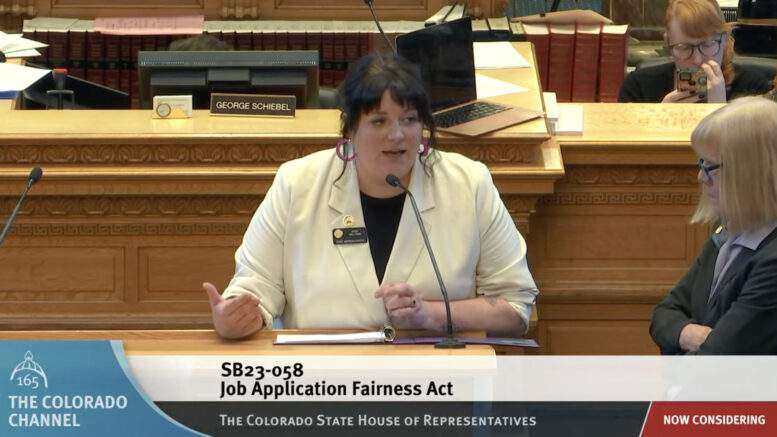Employers will have to remove questions from job applications about prospective workers’ ages and dates of schooling if Gov. Jared Polis signs into law a bill aiming to fight age discrimination that’s on its way to his desk.
Senate Bill 58, sponsored by Democratic Sens. Jessie Danielson of Wheat Ridge and Sonya Jaquez Lewis of Longmont, is largely aimed at helping older Coloradans in the hiring process at a time when the state’s senior population is booming. By 2030, there are expected to be more than 1.1 million workers here who are at least 50 years old — a full one-third of the state’s workforce.
Yet, older women in particular say they feel they’ve been discriminated against in hiring because of their age, said Jeanette Hensley, a board member for the Colorado Center on Aging. She cited a survey that found also that more than 50% of older employees must leave their positions before they want and that less than 10% of those who do ever recover fully because of their difficulty in finding comparable new jobs.
How the bill fights age discrimination
Under SB 58, employers would have to remove from their application by July 2024 any questions about someone’s birth dates, the dates they attended academic institutions or the dates they graduated. Employers could ask applicants, under an amendment added in the House, for copies of transcripts or other materials showing they completed courses required for the job, but the applicants would be able to retract the dates on those submissions.
Co-sponsoring Rep. Jenny Willford, D-Northglenn, argued that the bill does not put an undue burden on businesses. But it does protect both older jobseekers and some younger applicants in that it lets them get their foot in the door before an employer can ask about more specific schooling information in subsequent interviews, nixing the chance that they are rejected initially based on age.
“In the way that age discrimination can impact older adults, it can also impact younger adults,” Willford, one of the younger members of the Legislature, explained to the House Business Affairs and Labor Committee during an April 5 hearing. “When we eliminate birth dates and graduation dates on a job application, we allow candidates’ experience to speak for itself.”
One more employer regulation
While business groups offered only limited opposition — and many said the House amendment allowing them to seek transcripts with redacted dates improved SB 58 immensely — opponents offered frustration that this bill represents one more regulation being piled onto employers. SB 58 comes in the same year when legislators are seeking to ramp up requirements in the state’s equal-pay law, looking to loosen requirements on what constitutes workplace harassment and tried unsuccessfully to regulate how restaurants and retailers set workers’ schedules.
Rep. Rick Taggart, a Grand Junction Republican who ran international companies before entering politics, said that even the allowance of redaction of schooling dates on transcripts will make it harder for employers to verify resumés, potentially allowing fraudsters to sneak through. Sen. Jim Smallwood, R-Douglas County, said putting more barriers on what employers can ask of potential employees will stunt conversations further and erect unnecessary barriers.
“I think this bill is virtue-signaling,” said Sen. Bob Gardner, R-Colorado Springs. “While age discrimination for the sake of age is inappropriate, it’s not inappropriate for the employer to be making decisions based on ‘What’s the life span of the employee? What’s the experience level of the employee?’ … For the most part, this is just unrealistic.”
What happens next
The bill passed both the House and the Senate on fully partisan, Democratic-led votes. Polis must sign it, veto it or let it become law without his signature by June 7.
Some observers have referred to SB 58 as the “Ban the Box for Birthdates” bill. A separate law, passed in 2019, banned employers from asking on initial applications if jobseekers have criminal records — a question that often was asked in the form of a box they needed to check.
